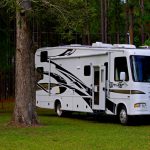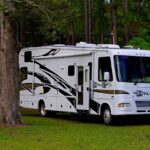Imagine waking up to the sunrise over a quiet forest, your home on wheels parked just where you want it. Sounds like freedom, right? But what if we told you that in many places across the U.S., living in an RV full-time can actually be illegal? Yep, despite the growing popularity of the #VanLife and full-time RV lifestyle, zoning laws, parking rules, and environmental regulations often throw up roadblocks that can turn your dream into a legal nightmare.
In this article, we’ll uncover the 7 surprising reasons why living in an RV is illegal in many areas, from pesky zoning restrictions to HOA battles and health code hurdles. Plus, we’ll share insider tips on how to stay legal, where to park safely, and real stories from RVers who’ve navigated these challenges. Whether you’re a weekend warrior or planning to hit the road full-time, understanding these legal twists is your ticket to worry-free RV living.
Ready to unlock the secrets and keep your wheels rolling legally? Let’s dive in!
Key Takeaways
- Zoning laws often prohibit RVs as permanent residences in many residential areas, making full-time RV living tricky without permits.
- Parking regulations vary widely—private property, RV parks, and public lands all have different rules about how long you can stay.
- Health, safety, and environmental codes require proper waste disposal, sanitation, and fire safety compliance to avoid fines.
- HOA restrictions can outright ban RV living on private property, so always check before parking your home on wheels.
- Some states like Florida and Texas are more RV-friendly, while others have stricter laws that can make living in an RV illegal.
- Campground memberships and RV parks offer legal, hassle-free options for long-term RV living with amenities and community.
- Staying informed and respectful of local laws is your best defense against legal trouble on the road.
Thinking about outfitting your RV for full-time living? Check out these top-rated solar generators to stay powered off-grid:
- Jackery Solar Generator 2000 Plus: RVShare | Outdoorsy | Jackery Official Website
- Jackery Solar Generator 3000 Pro: RVShare | Camping World | Jackery Official Website
Stay tuned as we unpack each legal hurdle and show you how to keep your RV lifestyle rolling smoothly!
Table of Contents
- Quick Tips and Facts About Living in an RV and Legal Issues 🚐⚖️
- The Legal Landscape: Why Is Living in an RV Illegal in Some Places? 🏛️
- 1. Zoning Laws and RV Residency Restrictions Explained 🏘️
- 2. Parking Regulations: Where Can You Legally Park Your Home-on-Wheels? 🅿️
- 3. Health and Safety Codes Impacting Full-Time RV Living 🛑
- 4. Environmental and Waste Disposal Laws You Should Know About 🌿🚮
- 5. HOA Rules and Private Property Challenges for RV Dwellers 🏡❌
- How Different US States Handle Full-Time RV Living: The Good, The Bad, and The Legal 🌎
- Campground Memberships and RV Parks: Your Legal Oasis? 🌴🏕️
- Tips and Tricks: How to Stay Legal While Living in Your RV Full-Time 🛠️✅
- Real Stories: When RV Living Went Illegal and How Folks Handled It 📖🔥
- Do You Have Questions About Living in an RV? Ask Us! ❓💬
- About Us: Your RV Legal Eagles at RV Brands™ 🦅🚐
- Conclusion: Navigating the Legal Maze of Living in an RV 🧭
- Recommended Links for RV Living and Legal Guidance 🔗
- Frequently Asked Questions (FAQ) About RV Living Legality ❓
- Reference Links and Legal Resources for RVers 📚
Quick Tips and Facts About Living in an RV and Legal Issues 🚐⚖️
Living in an RV full-time can be an amazing adventure, offering freedom and flexibility. But before you hit the open road, it’s crucial to understand the legal landscape surrounding RV residency.
Here are some key points to keep in mind:
- It’s not always illegal: While some places have strict restrictions, many states and municipalities allow RV living with proper permits and compliance with local ordinances.
- Zoning laws are key: These laws determine how land can be used, and they often restrict RV living in residential areas.
- Parking regulations matter: You need to know where you can legally park your RV for extended periods, whether it’s on private property, in RV parks, or on public land.
- Health and safety codes are important: RVs must meet certain standards for sanitation, waste disposal, and safety.
- Environmental regulations are crucial: You need to dispose of waste properly and minimize your impact on the environment.
- HOAs can be a challenge: If you’re living in an RV on private property within a homeowners’ association, you’ll need to follow their rules.
Ready to learn more? Let’s dive into the details!
The Legal Landscape: Why Is Living in an RV Illegal in Some Places? 🏛️
The legality of living in an RV can be a bit of a legal maze, and it varies significantly depending on where you are. Here’s a breakdown of the common reasons why RV living might be restricted:
1. Zoning Laws and RV Residency Restrictions Explained 🏘️
Zoning laws are the foundation of how land is used in a community. They dictate whether a particular area is zoned for residential, commercial, industrial, or agricultural purposes.
- Residential zoning: Often restricts RV living to temporary stays, as they are typically considered vehicles rather than permanent dwellings.
- Commercial zoning: May allow RV parks or campgrounds, but not necessarily full-time residency in RVs.
- Agricultural zoning: May be more flexible, but still subject to local regulations.
The bottom line: Zoning laws are designed to maintain the character and safety of a community, and they can significantly impact your ability to live in an RV full-time.
2. Parking Regulations: Where Can You Legally Park Your Home-on-Wheels? 🅿️
Parking regulations are another critical aspect of RV living. Here’s what you need to know:
- Private property: You generally need permission from the property owner to park your RV, and they may have specific rules about how long you can stay.
- RV parks and campgrounds: These are designed for RV living, and they typically have fees and rules you need to follow.
- Public land: Some public lands, like national forests and Bureau of Land Management (BLM) land, allow dispersed camping, but there are often limits on how long you can stay in one spot.
- Street parking: Many cities and towns have restrictions on overnight parking, especially in residential areas.
It’s essential to research the specific parking regulations in your area before you park your RV for an extended period.
3. Health and Safety Codes Impacting Full-Time RV Living 🛑
Health and safety codes are designed to protect the public from hazards, and they can impact RV living in several ways:
- Sanitation: RVs must have working toilets, sinks, and showers to meet basic sanitation standards.
- Waste disposal: You need to dispose of sewage and garbage properly, and some areas may require connection to a sewer system.
- Fire safety: RVs must have working smoke detectors and fire extinguishers.
- Electrical safety: Electrical systems must be properly installed and maintained to prevent hazards.
Failure to comply with health and safety codes can result in fines or even the removal of your RV.
4. Environmental and Waste Disposal Laws You Should Know About 🌿🚮
Environmental regulations are becoming increasingly important, and they can impact RV living in several ways:
- Wastewater disposal: You need to dispose of sewage properly, and some areas may require connection to a sewer system.
- Garbage disposal: You need to dispose of garbage properly, and some areas may have specific rules about how to do so.
- Water conservation: Some areas may have restrictions on water use, especially during droughts.
- Noise pollution: You need to be mindful of noise levels, especially in residential areas.
It’s essential to be aware of and comply with environmental regulations to protect the environment and avoid fines.
5. HOA Rules and Private Property Challenges for RV Dwellers 🏡❌
Homeowners’ associations (HOAs) can be a significant challenge for RV dwellers, as they often have rules that restrict or prohibit RV living.
- Parking restrictions: HOAs may limit the number of vehicles you can park on your property, including RVs.
- Aesthetic guidelines: HOAs may have rules about the appearance of your RV, such as requiring it to be covered or painted a certain color.
- Duration of stay: HOAs may limit how long you can park your RV on your property.
If you’re planning to live in an RV on private property within an HOA, it’s essential to review their rules carefully and get their permission before you move in.
How Different US States Handle Full-Time RV Living: The Good, The Bad, and The Legal 🌎
The United States is a vast and diverse country, and each state has its own laws and regulations regarding RV living. Some states are more RV-friendly than others, while some have strict restrictions.
Here’s a general overview of how different states handle RV living:
- RV-friendly states: States like Florida, Texas, Arizona, and South Dakota generally have more relaxed laws and regulations regarding RV living.
- States with stricter regulations: States like Hawaii, Delaware, and Idaho have stricter laws and regulations that may make it difficult or impossible to live in an RV full-time.
It’s essential to research the specific laws and regulations in the state where you plan to live in an RV.
Campground Memberships and RV Parks: Your Legal Oasis? 🌴🏕️
Campground memberships and RV parks can be a great option for full-time RV living, as they provide a legal and regulated place to park your RV.
- Campground memberships: Offer access to a network of campgrounds, often with discounts and other benefits.
- RV parks: Provide amenities like hookups for water, sewer, and electricity, as well as other amenities like laundry facilities, swimming pools, and recreation areas.
Campground memberships and RV parks can be a good way to ensure you have a legal and safe place to live in your RV.
Tips and Tricks: How to Stay Legal While Living in Your RV Full-Time 🛠️✅
Here are some tips to help you stay legal while living in your RV full-time:
- Research local laws: Before you move to a new area, research the local laws and regulations regarding RV living.
- Obtain necessary permits: If you need a permit to live in an RV, make sure you obtain it before you move in.
- Comply with health and safety codes: Make sure your RV meets all health and safety codes, and dispose of waste properly.
- Be respectful of your neighbors: Be mindful of noise levels and other potential nuisances.
- Consider a campground membership or RV park: These can provide a legal and regulated place to live in your RV.
By following these tips, you can help ensure that you’re living in your RV legally and responsibly.
Real Stories: When RV Living Went Illegal and How Folks Handled It 📖🔥
We’ve heard from countless RVers who’ve encountered legal challenges while living in their RVs. Here are a few real stories:
- The Case of the “Permanent” Parking Spot: A couple living in their RV on private property in a rural area was told they had to move because their RV was considered a “permanent structure” and violated local zoning laws. They ended up finding a nearby RV park that allowed long-term stays.
- The HOA’s RV Ban: A family living in their RV on their property within an HOA was told they had to move because the HOA had a rule prohibiting RV living. They ended up selling their RV and moving into a traditional home.
- The City’s Overnight Parking Crackdown: A group of RVers who were using street parking in a city for overnight stays were ticketed and told they couldn’t park there anymore. They ended up finding a nearby campground that allowed overnight stays.
These stories highlight the importance of researching local laws and regulations before you move into an RV full-time.
Do You Have Questions About Living in an RV? Ask Us! ❓💬
We’re here to help! If you have any questions about the legality of living in an RV, please don’t hesitate to ask. We’re happy to share our expertise and help you navigate the legal maze of RV living.
About Us: Your RV Legal Eagles at RV Brands™ 🦅🚐
At RV Brands™, we’re passionate about helping people experience the freedom and adventure of RV living. We’re a team of RV enthusiasts with years of experience, and we’re committed to providing you with the information and resources you need to make informed decisions about your RV lifestyle.
We’re here to help you:
- Understand the legal landscape of RV living.
- Find the right RV for your needs.
- Plan your RV adventures.
- Stay safe and legal on the road.
We’re your one-stop shop for all things RV!
Conclusion: Navigating the Legal Maze of Living in an RV 🧭

So, why is living in an RV illegal in some places? As we’ve unraveled, the answer lies in a complex web of zoning laws, parking regulations, health and safety codes, environmental rules, and private property restrictions. The good news? Most states and communities allow RV living under the right conditions, especially when you park legally on private land or in designated RV parks.
Our key takeaway: Living in an RV full-time is absolutely doable — but it requires due diligence, respect for local laws, and a bit of savvy planning. Whether you’re boondocking on BLM land, settling into a campground membership, or parking on your own property, knowing the rules will keep you out of trouble and let you enjoy the freedom of the road.
If you’re dreaming of the RV lifestyle, don’t let legal worries hold you back. Instead, use them as a roadmap to find your perfect legal spot. And remember, the RV community is vast and supportive — you’re never alone on this journey!
Ready to take the plunge? Check out our detailed guides on Full-Time RVing and Luxury RVs to find the best rigs and tips for your adventure.
Recommended Links for RV Living and Legal Guidance 🔗
Looking for gear and resources to make your RV life legal and comfortable? Here are some top picks:
-
Jackery Solar Generator 2000 Plus:
RVShare | Outdoorsy | Jackery Official Website -
Jackery Solar Generator 3000 Pro:
RVShare | Camping World | Jackery Official Website -
Thousand Trails Membership:
Thousand Trails Official -
Harvest Hosts Membership:
Harvest Hosts Official -
Books on Amazon:
“The RV Living Guide: Everything You Need to Know to Live Full-Time in Your RV”
Amazon Link
“RV Living For Beginners: How to Live, Work, and Travel Full-Time in Your RV”
Amazon Link
Frequently Asked Questions (FAQ) About RV Living Legality ❓

What are the laws and regulations regarding full-time RV living in the US?
Answer: Laws vary widely by state, county, and city. Generally, full-time RV living is allowed on private property if zoning laws permit it and the RV meets health and safety codes. Many states like Florida, Texas, and Arizona are more RV-friendly, while others like Hawaii and Delaware have stricter restrictions. Always check local ordinances, as some places require permits or limit the duration of stay. For detailed state-by-state info, resources like The Traveling Elms provide excellent summaries.
Read more about “What State Has the Most RVs? Discover the Top 25 in 2025! 🚐”
Can you permanently live in an RV in a residential area without violating local ordinances?
Answer: Usually, no. Most residential zoning laws classify RVs as temporary dwellings or vehicles, not permanent homes. This means you cannot park your RV indefinitely on a residential street or lot without violating local ordinances. However, some rural or agricultural zones may be more lenient. If you own private land, you might be able to live in an RV legally, but it often requires permits and compliance with septic and utility regulations. Always consult your local zoning office before making plans.
How do I find RV-friendly cities and states that allow long-term parking and living?
Answer: Start by researching state and local laws, focusing on zoning, parking, and health codes. Websites like Carolyn’s RV Life and Escapees RV Club offer community insights and resources. Membership-based camping networks like Harvest Hosts and Thousand Trails also provide legal and convenient places to park long-term. Additionally, connecting with local RV clubs or online forums can give you insider tips on RV-friendly spots.
What are the consequences of getting caught living in an RV without proper permits or in a prohibited area?
Answer: Consequences vary but can include fines, citations, orders to move, or even towing of your RV. In some cases, repeated violations can lead to legal action or eviction from private property. Beyond legal penalties, improper waste disposal or safety code violations can pose health risks and environmental damage, leading to further enforcement. The best defense is to stay informed, obtain necessary permits, and respect local laws to avoid headaches.
Are there any practical tips for staying legal and comfortable while living in an RV full-time?
Answer: Absolutely! Here are some pro tips:
- Always research local laws before parking or settling.
- Use campground memberships like Thousand Trails for legal long-term stays.
- Keep your RV in good repair and compliant with health and safety codes.
- Dispose of waste properly and follow Leave No Trace principles.
- Maintain good relations with neighbors and local authorities.
- Consider investing in solar generators like Jackery for off-grid power.
Reference Links and Legal Resources for RVers 📚
For further reading and verification, check out these reputable sources:
- Carolyn’s RV Life: Is Living in an RV or Van REALLY Illegal Now?
- The Traveling Elms: What States Allow You to Live in an RV?
- Jackery Blog: Why Is Living in an RV Illegal? Everything You Need to Know
- Escapees RV Club — Mail forwarding and residency services for RVers
- Harvest Hosts — Unique overnight stays at wineries, farms, and attractions
- Thousand Trails — Membership camping network for RVers
- BLM.gov — Information on dispersed camping on public lands
Ready to hit the road legally and confidently? Remember, knowledge is your best co-pilot! 🚐✨




